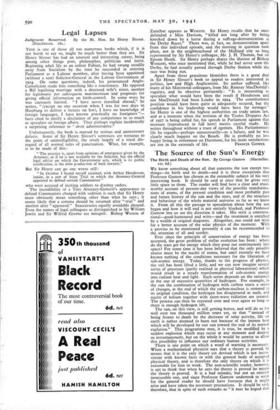Legal Lapses
Judgment Reserved. By the Rt. Hon. Sir Henry Slesser. (Hutchinson. 18s.) Tins is one of those all too numerous books which, if it is not harsh to say so, might be much better than they are. Sit Henry Slesser has had an unusual and interesting career, being among other things poet, philosopher, politician and jurist. Beginning adult life as an ardent Fabian, he had swung steadily away from Socialism by the time he succeeded in entering Parliament as a Labour member, after having been appointed (without a seat) Solicitor-General in the Labour Government of 1924. On some questions, indeed, his pronounced Anglo- Catholicism made him something like a reactionary. He opposed a Bill legalising marriage with a deceased wife's niece, another for legitimatio per subsequens matrimonium and proposals for giving official information on birth-control. In some ways he was curiously limited. " I have never travelled abroad," he writes, " (except on one occasion when I was for two days in Hamburg to deliver a lecture on law), I have no knowledge of foreign languages, I have known practically no foreigners "- facts cited to justify a disclaimer of any competence to so much as speculate on foreign affairs. They perhaps explain incidentally a surprising reference to droit administrative."
Unfortunately, the book is marred by serious and unnecessary defects. Some of Sir Henry Slesser's sentences are tortuous to the point of unintelligibility, the result largely of a royal dis- regard of all normal rules of punctuation. What, for example, is to be made of this : " The practice is, apart from opinions of emergency given by the Attorney, or if he is not available by the Solicitor, but the official legal advice on which the Government acts, which is its public justification, is the joint production of both lawyers."
But Sir Henry can go one worse still : " In October I found myself retained, with Arthur Henderson junior, in a sort of State Trial in which the Attorney-General appeared to defend certain Communists " who were accused of inciting soldiers to disobey orders.
The incredibility of a Tory Attorney-General's appearance to defend Communists charged with sedition is such that Sir Henry must obviously mean something other than what he says ; it seems likely that a comma should be assumed after " trial " and another after " appeared." Inaccuracies equally avoidable abound. Even the names of legal colleagues as distinguished as Sir William Jowitt and Sir Wilfrid Greene are misspelt. Bishop Weston of Zanzibar appears as Western. Sir Henry recalls- that he once defended a Miss Davison, "killed not long after by being knocked down by a horse during a suffrage-demonstration at the Derby Races." There was, in fact, no demonstration apart from this individual episode, and the meeting in question took place, not in the neighbourhood of the Midland city so long represented by Sir Henry's colleague, Mr. J. H. Thomas, but on Epsom Heath. Sir Henry perhaps shares the illusion of Bishop Westcott, who once mentioned that, while he had never seen the Derby, he had actually passed through Derby Station while the race was being run.
Apart from these gratuitous blemishes there is a great deal in Sir Henry Slesser's book to appeal to readers interested in politics, law and High Anglicanism. Its author suffered, like many of his Ministerial colleagues, from Mr. Ramsay MacDonald's vagaries, and he observes pertinently : " It is interesting to speculate what would have been the result if Henderson and not MacDonald had been Leader in 1924. The constitutional position would have been quite as adequately secured, but the confidence in his leadership would have been far stronger." Sir Henry is one of the highest authorities on trade union law, and at a moment when the revision of the Trades Disputes Act of 1927 is being called for, his speech in Parliament against that measure (reproduced in full here) merits careful study. He writes throughout without a trace of egotism. His Parliamentary life he regards—perhaps unnecessarily—as a failure, and he was clearly much happier on the Bench. He is probably no less happy living in retirement on Dartmoor, for his main satisfactions
are not in the externals of life. FRANCIS GOWER.






























 Previous page
Previous page